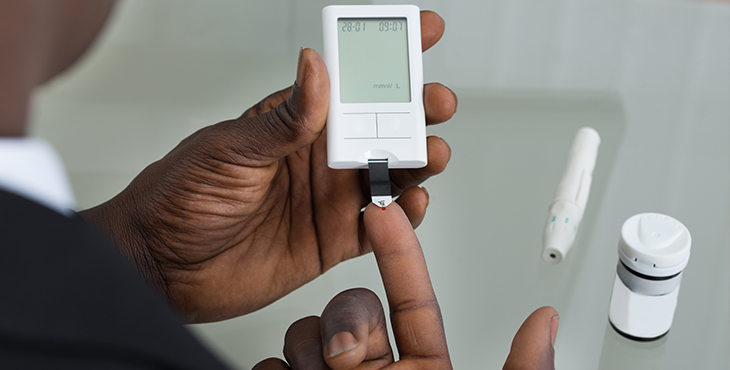Photo: ©iStock/AndreyPopov
VA researchers have published long-term follow-up results from a major diabetes trial, showing that patients saw no significant drop, on average, in heart attacks or strokes—despite intensive therapy to lower blood sugar levels.
The results appeared in the New England Journal of Medicine in June 2019, a year after they were presented at a symposium of the American Diabetes Association.
In 15-year findings from the VA Diabetes Trial (VADT), researchers found that nearly six years of aggressive lowering of blood sugar levels resulted in a slight decline in cardiovascular events—a composite of heart attack, stroke, cardiovascular death, congestive heart failure, and amputation from gangrene—when compared with standard therapy. But the difference was not statistically significant.
The intensive therapy also appeared to make little difference in terms of deaths from any cause. Likewise, rates of kidney problems were similar between the intensive and standard groups.
In 10-year follow-up results published in the New England Journal of Medicine in 2015, patients in the aggressive-therapy group had a significant 17 percent drop in cardiovascular events. But that decline didn’t extend to 15 years. By that point, blood sugar levels had become similar again between the two groups. That suggested there was no carry-over benefit or “legacy effect” from the earlier period.
Blood sugar, or glucose, levels rise higher than normal in people with diabetes. Reducing blood sugar to normal levels is also known as tight or intensive glycemic control. In less aggressive therapy, the goal may be to slightly lower levels but not to get them quite to normal.
“Remember, there was a significant cardiovascular benefit of good sugar control at 10 years,” said Dr. Nicholas Emanuele, one of the three lead investigators on the VADT follow-up. “So, one interpretation of this is that good glycemic control is beneficial. But it must be sustained, or the benefit is lost.”
Emanuele is a specialist in endocrinology, diabetes, and metabolism at the Edward Hines, Jr. VA Hospital in Illinois.
The VA Diabetes Trial began in 2000. It included 1,791 participants from 20 VA medical centers and was sponsored by the VA Cooperative Studies Program.
To read more about this research, visit VA Research Currents. To learn more about other VA research on this area, visit our web topic page on diabetes.
Topics in this story
More Stories
In a new series that highlights advancements in VA health care, VA researchers and clinicians are appearing on a Veteran-themed media platform—Wreaths Across America Radio—to tout their critical work.
Recently published findings from the VA Disrupted Care National Project […]
Diverse representation of women in health care research allows MVP to make discoveries for women’s health







โหลด เพลง ลูกทุ่ง
Remember, there was a significant cardiovascular benefit of good sugar control at 10 years.good to know this.
“Remember, there was a significant cardiovascular benefit of good sugar control at 10 years,” said Dr. Nicholas Emanuele, one of the three lead investigators on the VADT follow-up. “So, one interpretation of this is that good glycemic control is beneficial. But it must be sustained, or the benefit is lost.”
Type I or Type II diabetes?
I put in for ptsd, diabetes, got 40%together. I have heart skips, nerves bad(take all kinds of depression meds, need agent orange physical (had one way back in 70’s when it was said there was no problem with it was in it, dead plants trees everywhere, have bad flashbacks, can hardly go out in crowded areas, have to see the doors when I’m in a place to eat, paranoid,. More than that. I put in for disability in 2001 and keep getting rejected. Have bed hearing and went to a hearing dr. here at home and he said I needed aids. Went to Columbia, SC to the VA and was tested and said I was ok. I’m going to have to start back again with all new records that I have since the last time . Will start where I left of. My doctor said I had PTSD. I did finally get 40%some years ago. 10% for PTSD and 30%for my diabetes. I here our President Trump has different people working at the VA now, mostly VA personnel. I am going to try for more disability went my Doctor can get me the rest of my records together from what I have already sent. With all that is wrong with me, not being able to sleep even with meds. I have had to have 2 stints in the last 2 years. Heart goes crazy trying to find right way to beat. Stops and then starts. I hope this time the VA will listen. I feel like just giving up and who knows
So does this mean the VA is going to stop beating up patients for not following a program that really does not work?
Very informative blog for anyone with diabetes.